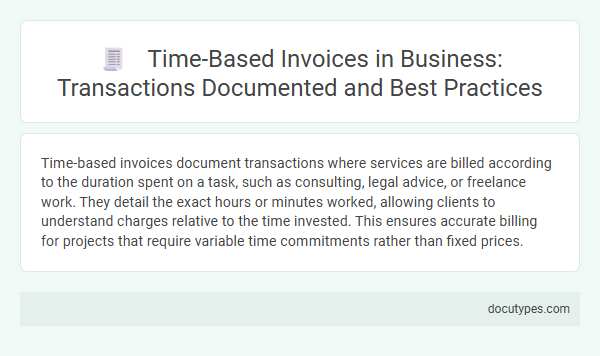Time-based invoices document transactions where services are billed according to the duration spent on a task, such as consulting, legal advice, or freelance work. They detail the exact hours or minutes worked, allowing clients to understand charges relative to the time invested. This ensures accurate billing for projects that require variable time commitments rather than fixed prices.
Understanding Time-Based Invoices in Business
What specific transactions are documented with time-based invoices? Time-based invoices record services billed according to the hours or minutes worked, making them essential for businesses like consulting, freelancing, and legal services. These invoices capture detailed time entries to ensure accurate billing and transparency between service providers and clients.
Key Components of a Time-Based Invoice
Time-based invoices document transactions where services are billed according to the actual time spent, such as consulting, legal work, or freelance projects. Key components include the date and duration of service, hourly rate or agreed-upon time unit, and a detailed description of tasks performed. Your invoice should clearly outline these elements to ensure accurate billing and transparency between you and your client.
Benefits of Using Time-Based Invoicing
| Specific Transactions Documented with Time-Based Invoices | Benefits of Using Time-Based Invoicing |
|---|---|
| Hourly consulting services | Accurate billing for actual time spent on tasks |
| Freelance creative projects tracked by hours | Enhanced transparency between client and service provider |
| Legal services recorded per billable hour | Improved financial tracking and forecasting |
| Equipment rental charged by time used | Flexibility to invoice for varying durations of service |
| Technical support billed for support hours | Facilitates detailed audit trail for service delivery |
| Project management billed based on time invested | Encourages efficient time allocation and productivity |
Common Use Cases for Time-Based Invoices
Time-based invoices document transactions where billing depends on the duration of work performed. These invoices provide a clear breakdown of hours spent on specific tasks or services.
- Consulting Services - Billing clients based on the number of consulting hours delivered for projects or strategic advice.
- Freelance Work - Charging for creative or technical services, such as graphic design or programming, calculated by the time invested.
- Legal Services - Documenting billable hours for lawyers offering counsel, case research, and courtroom representation.
How to Accurately Track Billable Hours
Time-based invoices document transactions where services are billed according to the hours worked. Common examples include consulting, legal services, and freelance projects that require precise time tracking.
Accurately tracking billable hours involves using digital time-tracking tools or manual logs to record start and end times. Consistent documentation ensures transparency and prevents disputes over invoiced amounts.
Essential Details to Include in Time-Based Invoices
Time-based invoices document transactions where billing is calculated according to hours or units of time worked. These invoices provide detailed records critical for accurate client charging and project tracking.
- Transaction Hours or Duration - Specify the exact time spent on each task or service to ensure precise billing.
- Detailed Description of Services - Clearly outline the specific work performed during the billed time to maintain transparency.
- Rate Per Hour or Unit - Include the agreed-upon rate to calculate the total payable amount accurately.
Automating Time-Based Invoice Generation
Time-based invoices document transactions where billing is directly linked to the amount of time spent on a service. These invoices are commonly used in industries such as consulting, legal, and freelance work, where hours worked determine the payment due.
Automating time-based invoice generation improves accuracy by capturing work hours in real-time and reducing manual entry errors. Integration with time-tracking software enables seamless transfer of logged hours into invoice templates, accelerating the billing process. Automation also ensures consistent billing cycles and timely payments, enhancing cash flow management for businesses.
Legal Considerations and Compliance
Time-based invoices document transactions where services are billed according to the duration spent on a task or project. These invoices require precise record-keeping to meet legal standards and ensure compliance with industry regulations.
- Accurate Time Tracking - Documentation must reflect exact hours worked to avoid disputes and comply with labor laws.
- Contractual Compliance - Invoices must align with contractual agreements specifying billing rates and time increments.
- Tax and Regulatory Requirements - Proper invoicing supports adherence to tax laws and financial reporting standards in your jurisdiction.
Maintaining detailed records for time-based invoices protects your legal rights and facilitates transparent financial transactions.
Best Practices for Managing Time-Based Invoicing
Time-based invoices document transactions where services are billed according to hours, days, or project milestones. Common examples include consulting, freelance work, and legal services where precise tracking of work duration is essential.
Best practices for managing time-based invoicing include maintaining accurate time records and clearly itemizing each billed period. You should also use reliable invoicing software to streamline tracking and ensure timely payments.
What Specific Transactions Are Documented with Time-Based Invoices? Infographic

